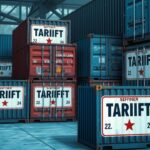Trump’s New Tariffs on Inexpensive Chinese Goods Following Executive Order
President Trump has signed an executive order to close a trade loophole that allowed Chinese goods under $800 to be exempt from tariffs. This constitutes a response to concerns over the opioid crisis and aims to impose new tariffs of 30%, effective May 2, which will impact companies like Temu and Shein significantly. Critics suggest this action may hurt lower-income consumers and burden the economy.
On Wednesday, President Trump signed an executive order aimed at closing a trade loophole concerning inexpensive goods from China, which were previously exempt from tariffs. He argued that the so-called “de minimis” exception allowed certain shippers from China and Hong Kong to conceal illicit substances in their shipments. This loophole, he asserted, significantly contributed to the opioid crisis in the United States by enabling duty-free exports valued at under $800.
Retailers such as Temu and Shein, which offer ultra-low-cost items to American consumers, could face substantial challenges due to the newly imposed tariffs. Earlier this year, Trump had briefly suspended the de minimis exemption but reinstated it to allow further planning for revenue collection by the Commerce Department. He confirmed that adequate systems are now in place to process tariff revenues from goods previously eligible for the duty-free treatment.
The upcoming tariffs will specifically apply to de minimis goods, replacing any other duties those shipments would typically incur, including Trump’s existing 20% levy on Chinese imports. Starting May 2, shipments valued under $800 will incur a 30% ad valorem duty or a fee of $25 per item, which will increase to $50 per item on June 1. Furthermore, all carriers transporting such international shipments must have an international carrier bond to guarantee duty payment.
Chinese fast-fashion brands have exploited the 1930s trade rule to boost their exports of low-value items, with exports skyrocketing to $66 billion in 2023 from just $5.3 billion in 2018, as per a report by the Congressional Research Service. Originally, the de minimis exception aimed to facilitate duty-free travel for tourists bringing items home but has instead benefited large-scale retail operations.
Critics, such as the Cato Institute, argue against the exclusion, highlighting its importance as a trade facilitation tool that favors lower-income consumers. Research indicates that low-income areas receive significantly more de minimis shipments than affluent regions. The Cato Institute has warned that eliminating the exemption could burden Americans with an annual cost ranging from $11 billion to $13 billion, equating to about $35 to $80 per individual. Trump’s executive action was executed concurrently with the announcement of reciprocal tariffs on numerous countries.
In summary, President Trump’s executive order serves to close a loophole that has allowed inexpensive Chinese goods to evade tariffs under the de minimis exemption. While this move is positioned as a measure to combat the opioid crisis, it imposes new financial burdens on American consumers, particularly those in lower-income brackets. The tariffs, effective from May 2, signal a significant shift in trade policy that may have substantial economic implications for both consumers and international retailers.
Original Source: nypost.com








Post Comment